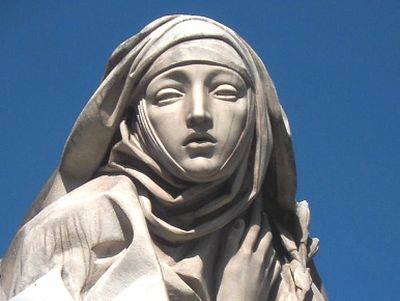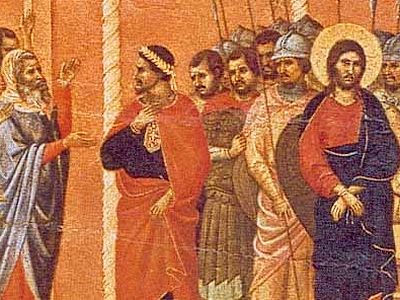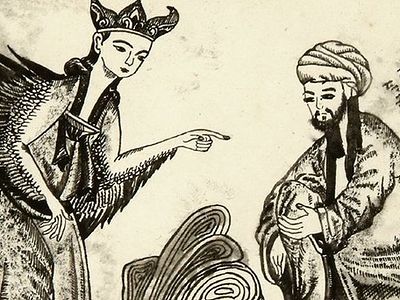Monotheism is not only the oldest but also the original form of religion. This is recognized both by Christian theologians as well as by many historians of religion. In the first chapter of the book of Genesis, only one God is mentioned. There are no references to any other "gods": "In the beginning God created the heaven and the earth" (Gen. 1:1); "And the Lord said..." (Gen. 6:3); "And God saw..." (Gen. 6:5); "Thus did Noah; according to all that God commanded him, so did he" (Gen. 6:22).
The retreat from monotheism took place after the events of the tower of Babel. The fallen nature of man was increasingly rooted in sin. Gradually, the notion of God became obscure. In human life, sensual and carnal inclinations prevailed. The deep-seated habit of attaching value only to that which is entirely visible and tangible, as well as a vital dependence on the natural environment and a fear of the natural elements, led people to deify the sun, moon, stars, sea, rivers, mountains, animals, plants, and people (rulers and heroes). As the Holy Apostle Paul writes, idolaters "changed the truth of God into a lie, and worshipped and served the creature more than the Creator" (Rom. 1:25).
At that time, pagan nonbelief was ubiquitous. It had even infected those who descended from Patriarch Abraham. The Lord speaks through Joshua to the Jews: "our fathers dwelt on the other side of the flood in old time, even Terah, the father of Abraham, and the father of Nachor: and they served other gods" (Josh. 24:2). God called upon Abraham and took him from the land of his ancestors in order to keep intact true veneration of the Divine, by which Abraham differed from his other contemporaries: "And I took your father Abraham from the other side of the flood, and led him throughout all the land of Canaan" (Josh. 24:3).
Patriarch Abraham is the father of the chosen people. He occupies a special place in the Divine Economy of our salvation. His calling was not only the first stage in the fulfillment of the divine plan for the salvation of mankind, but also determined its basic direction. From his calling to his death, he found himself under special divine guidance. God directed him throughout his life. Abraham, having perfect faith, submitted unconditionally to the divine will. "Abraham believed God, and it was counted unto him for righteousness" (Rom. 4:3).
From Patriarch Abraham begins the history of the nation, from which came the Most Holy Virgin Mary, who gave birth to the Savior of the world. Indeed, Christians derive their spiritual lineage from Abraham: "And if ye be Christ's, then are ye Abraham's seed, and heirs according to the promise" (Gal. 3:29).
Patriarchs Isaac and Jacob, and all subsequent successors remained faithful to God alone. Even in Egypt among the gentiles, Abraham's great-grandson, Joseph, occupying a high position in the state, preserved the faith of his fathers. Meeting with his brothers, he said to them, "So now it was not you that sent me hither, but God: and he hath made me a father to Pharaoh, and lord of all his house, and a ruler throughout all the land of Egypt" (Gen. 45:8).
After the Egyptian captivity, monotheism was inscribed as the chief commandment of the Mosaic law: "Hear, O Israel: The Lord our God is one Lord" (Deut. 6:4); "I am the Lord thy God, which have brought thee out of the land of Egypt, out of the house of bondage. Thou shalt have no other gods before me" (Exod. 20:2-3). Any form of idolatry was prohibited as a crime (see Deut. 13:15-19).
Israelite society was a theocracy (in Greek theos means God and kratos means power or might). God the Creator was not only the Leader, Providence, and Lawgiver of the nation, but also its Judge. The whole life of the people was to be built on these theocratic principles. The Old Testament laws were predicated upon faith in God, Who made Israel His people and entered into a Covenant with them.
During the prophetic period, biblical monotheism receives the ultimate clear, theological justification. The Lord speaks through the Prophet Isaiah: " I am the Lord, and there is none else" (Isa. 45:6). Also: "I am the first, and I am the last; and beside me there is no God" (Isa. 44:6). God is not only the only Creator of heaven and earth, but also the Lord, "he that giveth breath unto the people upon it, and spirit to them that walk therein" (Isa. 42:5).
The prophets were the custodians of monotheism. They rebuked not only ordinary Israelites, but even the kings, when they introduced idolatry. The prophets proclaimed the coming of the Messiah, Who will have Divine dignity. When a threat to the Kingdom of Judaea arose, the Lord says to King Ahaz: "Ask thee a sign of the Lord thy God" (Isa. 7:11). Ahaz refused. Then Prophet Isaiah delivered the famous Messianic prophesy: "Therefore the Lord himself shall give you a sign; Behold, a virgin shall conceive, and bear a son, and shall call his name Immanuel" (Isa. 7:14). The name "Immanuel" means "God is with us." The same prophet says about the Messiah: "unto us a son is given: and the government shall be upon his shoulder: and his name shall be called Wonderful, Counsellor, The mighty God, The everlasting Father, The Prince of Peace” (Isa. 9:6). Also: "Behold, the Lord God will come with strong hand, and his arm shall rule for him: behold, his reward is with him, and his work before him. He shall feed his flock like a shepherd" (Isa. 40:10-11).
The Monotheism of Christianity
Christianity, which reveals to the world the revelation of God as the all-perfect Spirit, raises the people of the new Israel to a higher level, teaching the worship of God in spirit and in truth (John 4:23). The incarnate God, Jesus Christ, revealed to humanity the supreme truth of salvation in the Kingdom of Heaven. Only the New Testament religion, which fully possesses a complete knowledge of the uncreated nature of God, and reveals to all the path to union with Him through prayer, holy sacraments, and fulfillment of the Gospel commandments, is the complete and succeeding monotheism. It is based on not only the firm foundation of biblical revelation given to the patriarchs and prophets. God Himself was incarnate and bore witness to the mysteries of the Divine Economy. In the high priestly prayer to God the Father, the Lord Jesus Christ says, "For I have given unto them the words which thou gavest me; and they have received them, and have known surely that I came out from thee, and they have believed that thou didst send me" (John 17:8).
For representatives of Judaism and Islam, the great stumbling block is the divinity of our Savior Jesus Christ. They are lured, despite the compelling evidence found in the sacred books of the New Testament.
The Holy Apostle Thomas was absent from the first appearance of the resurrected Savior to the disciples. Other apostles with whom Thomas met joyfully proclaimed the Teacher's resurrection. Thomas said, "Except I shall see in his hands the print of the nails, and put my finger into the print of the nails, and thrust my hand into his side, I will not believe” (John 20:25). The Savior answered Thomas' doubt with his own words, repeating the exact demand that Thomas himself had made. This could only amaze the doubting disciple, “Reach hither thy finger, and behold my hands; and reach hither thy hand, and thrust it into my side: and be not faithless, but believing" (John 20:27). In response, the Apostle Thomas confessed Jesus Christ as God: “My Lord and my God” (John 20:28).
The Apostle and Evangelist John the Theologian bears witness to the divinity of Jesus Christ: "In the beginning was the Word, and the Word was with God, and the Word was God" (John 1:1). In this text, God is directly referred to as the Word (Logos). The objection usually made at this point is very weak. It is said that Theos does not have an article, and therefore is not referring to a personal God. But in the sixth verse of this chapter, "There was a man sent from God, whose name was John" (John 1:6) there is also no article in front of the word Theos in the Greek text. However, we are talking about a personal God. We can provide other evidence. The Apostle and Evangelist Mark called Christ the Son of God: "The beginning of the gospel of Jesus Christ, the Son of God" (Mark 1:1).
The Apostle John the Theologian says in his first Epistle: "And we know that the Son of God is come, and hath given us an understanding, that we may know him that is true, and we are in him that is true, even in his Son Jesus Christ. This is the true God, and eternal life" (1 John 5:20).
The Holy Apostle Paul time and again writes about the Divinity of Jesus Christ in his Epistles. "Beware lest any man spoil you through philosophy and vain deceit, after the tradition of men, after the rudiments of the world, and not after Christ. For in him dwelleth all the fullness of the Godhead bodily" (Col. 2:8-9). We read in another Epistle: "But unto the Son he saith, Thy throne, O God, is for ever and ever: a sceptre of righteousness is the sceptre of thy kingdom. Thou hast loved righteousness, and hated iniquity; therefore God, even thy God, hath anointed thee with the oil of gladness above thy fellows” (Heb. 1:8-9). The Son of God is called God twice. The Greek text in both cases says Theos—God. There is even more. The Apostle Paul told the elders of the city of Ephesus, "Take heed therefore unto yourselves, and to all the flock, over the which the Holy Ghost hath made you overseers, to feed the church of God, which he hath purchased with his own blood" (Acts 20:28). The founder of the Church, Jesus Christ, is without a doubt called God. In the Epistle to Titus we read, "For the grace of God that bringeth salvation hath appeared to all men, Teaching us that, denying ungodliness and worldly lusts, we should live soberly, righteously, and godly, in this present world; Looking for that blessed hope, and the glorious appearing of the great God and our Saviour Jesus Christ" (Tit. 2:11-13). What could be clearer than "the great God and our Saviour Jesus Christ"?
The divinity of Jesus Christ, and consequently, Christianity's monotheism, endeavors to refute exemplars of Judaism and Islam. One of the main reasons is the inability to accommodate the teachings of the Holy Trinity, incarnation, resurrection, and other doctrinal truths into a narrow and distorted religious consciousness. Despite the antagonism between Judaism and Islam, both religions converge in that they criticize not Christianity—the theological heights and spiritual wealth of which they cannot comprehend—but its creation of the false image of New Testament religion.






